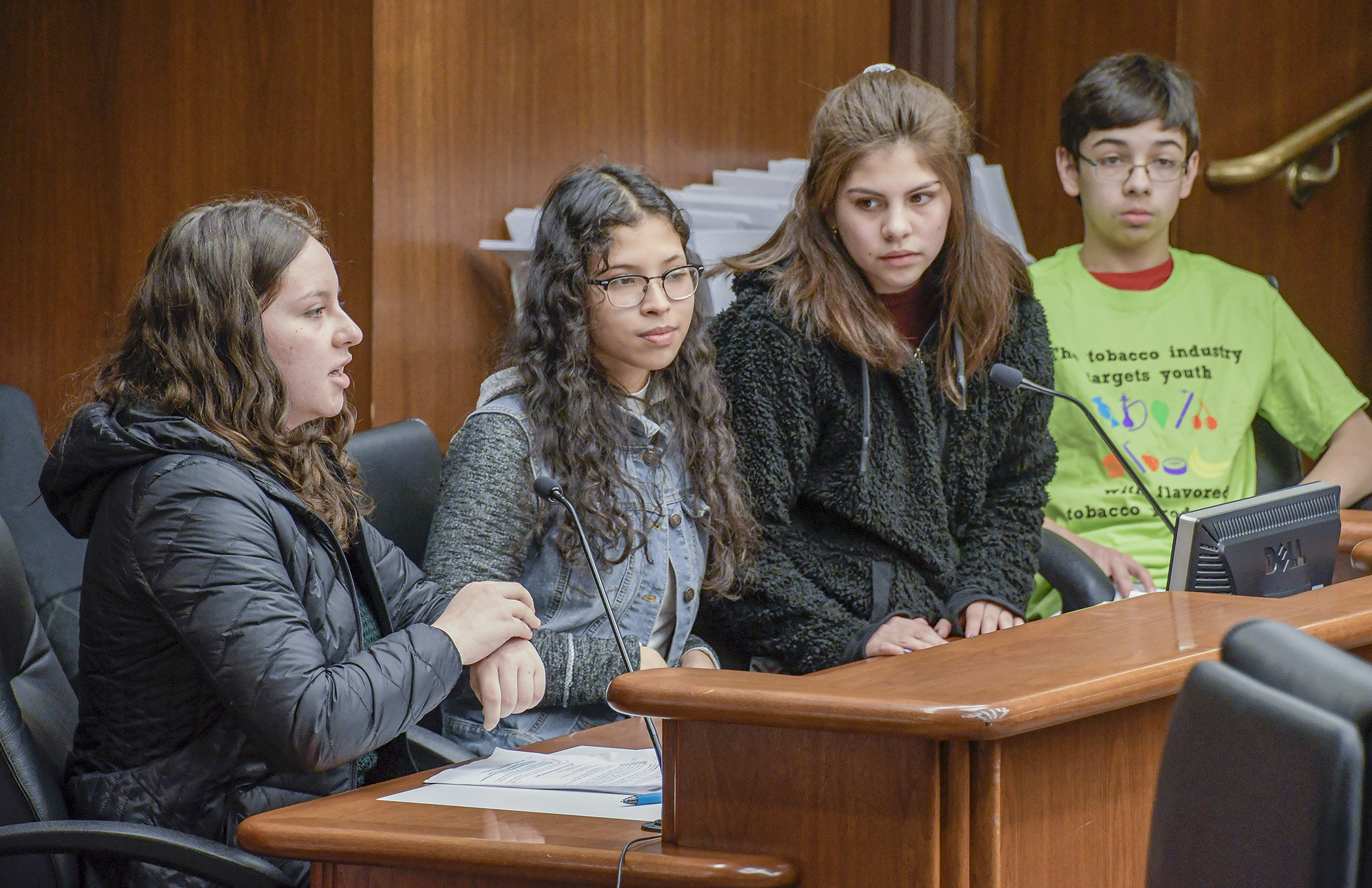Proposed ban on flavored tobacco products targets teen vaping

The “Puff Bar” is a disposable e-cigarette product that contains the same amount of nicotine you might find in three packs of cigarettes. It also “smells deliciously pretty and wonderful,” Rep. Laurie Halverson (DFL-Eagan) said, passing the small device around the House Health and Human Services Policy Committee Wednesday.
Good-smelling, nice-tasting flavors make tobacco use more appealing to children and could be banned under HF3032, sponsored by Halverson.
“This is something that we have needed to do for a very long time,” Halverson said.
The bill would ban the sale of all flavored tobacco products, including menthol cigarettes and many of the e-liquids used in vaping.
The committee heard testimony on HF3032 Wednesday, but did not take any action. It intends to discuss the bill on Friday, said Rep. Rena Moran (DFL-St. Paul), the committee chair. There is no Senate companion.
Supporters of the bill said that it takes an important step in protecting children, who are not only attracted by the whimsical flavors, but also lured into a false sense of security by them.
“Kids know that cigarettes are bad for them. They make their clothes stink and their teeth yellow,” said Dr. Lori DeFrance, a pediatrician with Essentia Health in Duluth. “But with e-cigarettes and other flavored tobacco products, they do not perceive the danger … it smells and tastes like mango or cotton candy.”
The tobacco industry has a “long history” of using flavorings to recruit new smokers, leading to a federal prohibition on cigarettes flavored with anything other than menthol or tobacco, Halverson said.
Even though it has long been exempt from flavor bans, menthol makes it dangerously easy to start smoking, said LaTrisha Vetaw, health policy and advocacy manager for NorthPoint Health & Wellness Center.
The flavoring has historically been used to recruit new smokers and drive cigarette consumption, especially in African American communities, she said.
The bill would also:
- expand the circumstances under which administrative penalties could be imposed on retailers or employees;
- increase administrative penalties;
- permit administrative penalties to be imposed on individuals who offer, sell, gift, or otherwise provide minors with tobacco, related devices, and e-cigarettes;
- require local governments to develop alternative penalties for minors who purchase, possess, and consume flavored tobacco products;
- establish penalties; and
- allow more stringent ordinances established by local governments.
Increased administrative penalties could go to support compliance and enforcement, Halverson said.
Opponents of the bill – including former smokers and retailers – stated that the ban would fail to produce the desired results.
The majority of children don’t start using tobacco products because of the flavors, but because of curiosity, or the influence of friends or family members, said Guy Bentley, director of consumer freedom research at the Reason Foundation.
In addition, they said, the ban would cause a wide range of negative consequences. People successfully using e-cigarettes to stop smoking would return to combustible cigarettes. Dangerous, unregulated “black-market” products would surge in popularity. And small businesses committed to keeping tobacco products away from minors would be unfairly penalized while “big tobacco” continues to thrive.
Ashley Olson, marketing manager for Pure X-hale, suggested the Legislature consider other methods of deterring underage vape use, like removing attractive, colorful labels, replacing whimsical flavor names like “alien blood” with more mundane descriptors, providing educational resources to parents, and imposing steeper penalties on anyone providing tobacco products to minors.
“I’ve heard so many parents try to buy stuff for their kids,” Olson said. “That is the problem. It is not age-restricted retailers like us.”
Halverson pre-empted some of these concerns in her opening comments, stressing that “dire predictions” were also made – but never realized – regarding the impacts of other anti-tobacco legislation, like banning smoking in bars and restaurants, or making tobacco more expensive in Minnesota than neighboring states.
“Those are the policies that got us our historically low tobacco use and businesses continued to thrive,” she said.
Related Articles
Search Session Daily
Advanced Search OptionsPriority Dailies
Ways and Means Committee OKs proposed $512 million supplemental budget on party-line vote
By Mike Cook Meeting more needs or fiscal irresponsibility is one way to sum up the differences among the two parties on a supplemental spending package a year after a $72 billion state budg...
Meeting more needs or fiscal irresponsibility is one way to sum up the differences among the two parties on a supplemental spending package a year after a $72 billion state budg...
Minnesota’s projected budget surplus balloons to $3.7 billion, but fiscal pressure still looms
By Rob Hubbard Just as Minnesota has experienced a warmer winter than usual, so has the state’s budget outlook warmed over the past few months.
On Thursday, Minnesota Management and Budget...
Just as Minnesota has experienced a warmer winter than usual, so has the state’s budget outlook warmed over the past few months.
On Thursday, Minnesota Management and Budget...